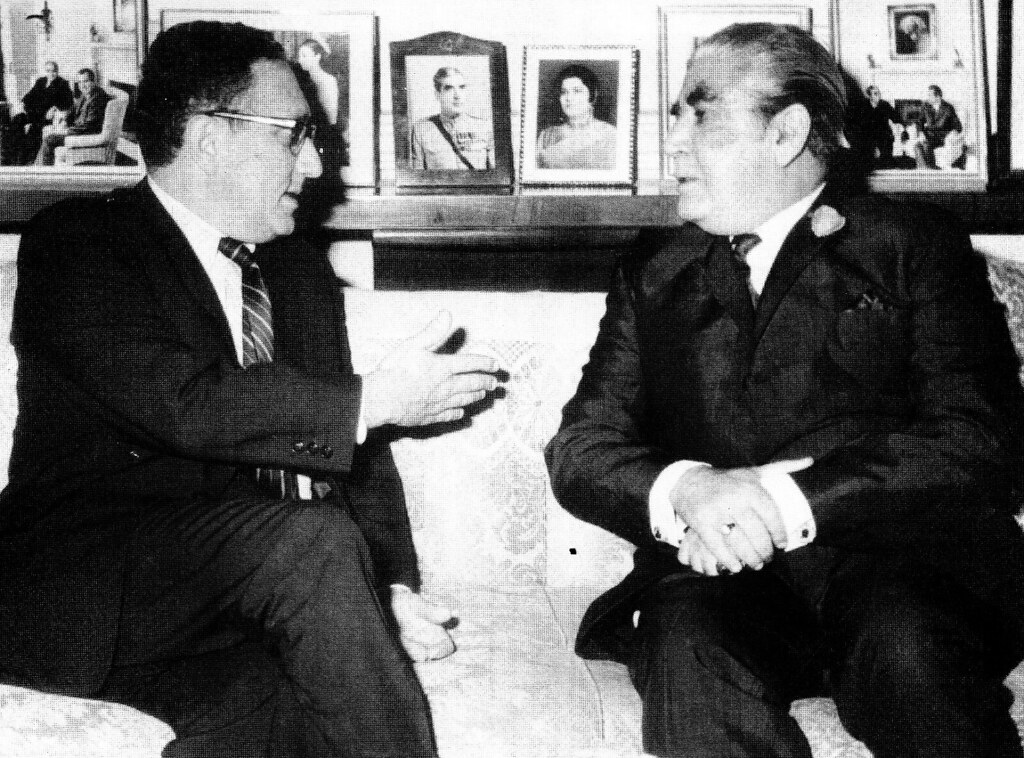At age 100, after decades of fame, fortune, and acclaim, Henry Kissinger has finally died. While etiquette traditionally discourages dancing on graves, I believe that an exception should be made in this case: Henry Kissinger was not a good man. He was not a genius. He was not a public servant. Henry Kissinger was a paranoid, narcissistic, egomaniacal warmonger. He was a man unbothered by the buckets of blood on his hands; an avatar of unrepentance.
Only one thing seems unjust about Henry Kissinger’s passing: that it came peacefully in his own bed – a privilege he denied to countless thousands.
Despite these truths, the obituaries being run by most major news outlets in the wake of his death have been ambivalent about the morality and consequences of Kissinger’s actions. Some have even praised him. As someone who believes deeply in democracy and the rule of law, two things Kissinger abandoned at every possible opportunity, I want to offset that undue praise with some hard-earned opprobrium.
During the Nixon and Ford administrations, from the late 1960s to the late 1970s, Henry Kissinger was the United States’ most influential practitioner of foreign policy. He served as National Security Advisor from 1969 to 1975, and as Secretary of State from 1973 to 1977 – spending two years holding both roles. In those roles, he championed an aggressive foreign policy which saw the United States expand its military entanglements around the globe, and forever changed how large swaths of the world see America. Decisions Kissinger personally ordered continue to claim lives to this day, mostly via unexploded ordnance in Cambodia and Laos.
As National Security Advisor and Secretary of State, Kissinger was the country’s chief evangelist for a kind of “American values” which placed no value on the lives, liberty, or pursuit of happiness of non-Americans; a man whose personal flaws were given room to exercise themselves against innocent civilian populations around the world.
Though often lionized for his efforts in “ending the Vietnam War” – a war which the United States lost, a fact helpfully memorialized by Saigon now being named Ho Chi Minh City – Kissinger’s real contribution to the war in Vietnam was to expand it across Indochina. In March of 1969, after months of lobbying for the idea, Kissinger convinced Richard Nixon to embark on a heavy bombing campaign in Cambodia, which, despite bordering Vietnam, was not a party to the war. Over the next four years, this bombing campaign evolved into what has been remembered as the United States’ “Secret War” in Cambodia and neighboring Laos, which Kissinger had oversight of. Modern estimates are that Kissinger ordered the use of nearly 3 million tons of munitions in Cambodia – roughly equivalent to the amount used in the entirety of World War II.
The bombing campaign killed hundreds of thousands of Cambodian civilians. The years-long Secret War destabilized the country to the extent that it was plunged into three decades of civil war and the Khmer Rouge’s reign of terror. Many of the bombs Kissinger ordered dropped on Cambodia and Laos remain buried in the ground of those countries, periodically claiming lives: since 1979, unexploded ordnance has claimed more than 64,000 casualties in Cambodia. Even though Kissinger has died, the decisions he made in Vietnam, Cambodia, and Laos will continue killing innocent civilians for years to come.
In Latin America, Kissinger repeatedly subverted democratic governments, and helped to replace them with military dictatorships. When Salvador Allende – a man who was objectively not a Communist – was elected President of Chile, Kissinger famously quipped, “I don’t see why we need to stand by and watch a country go Communist due to the irresponsibility of its own people.”
Kissinger did not stop with quips, though: instead, he backed a military coup led by the far-right soon-to-be despot Augusto Pinochet. In the following years, Pinochet’s regime kidnapped, killed, and otherwise disappeared more than 40,000 Chilean civilians. From D.C. Kissinger ensured that Pinochet had all the support he needed. To this day, more than 3,000 of Pinochet’s victims have never been accounted for, and their families given no answers.
Kissinger’s worst crime was the explicit support of genocide – something he managed to make the United States complicit in not once, but twice, in the space of four years: first in Bangladesh, then in East Timor.
In 1971, as Nixon and Kissinger prepared to open diplomatic relations with Mao’s China, they encountered a problem: Yahya Khan, the strongman ruler of Pakistan who was serving as the United States’ intermediary to China, was at risk of losing power. At the time, the country which is now Bangladesh was the eastern part of the noncontiguous Pakistani state which came into existence during the Brits’ hasty withdrawal from India. Uncomfortably for Yahya, whose base of power was in West Pakistan, by the early 1970s the Bangladeshi voting population had outgrown the West Pakistani voting population. In an attempt to “solve” this problem, Yahya sent troops into Bangladesh with the explicit intent to reduce the population by a meaningful percentage. Nixon and Kissinger not only refused to condemn Yahya, they supported his genocide and – over the explicit objections of the U.S. Congress – sent shipments of arms to Yahya with which his forces could carry out a genocide. When the U.S. consulate staff in Dacca sent a cable to D.C. warning that U.S. policy was supporting a genocide, Kissinger attempted to have most of the consulate staff fired. Modern estimates are that between 1,000,000 and 1,500,000 Bangladeshis were killed with Henry Kissinger and Richard Nixon’s full support.

In 1975, Suharto, the U.S.-allied ruler of Indonesia, saw an opportunity: the neighboring Portuguese colony of East Timor was making moves towards independence, and Suharto wanted to claim the land for Indonesia when the Portuguese left. Knowing which side his bread was buttered on, Suharto ran these plans past Kissinger and President Ford. According to documents in the National Security Archive at George Washington University, Kissinger gave Suharto “a green light,” and told him that the United States would not interfere. All Kissinger asked was that Suharto wait to start the invasion until he and Ford returned to D.C. so that they would be on-hand to “influence the reaction in America.” Suharto’s invasion of East Timor, now remembered as a genocide, killed between 100,000 and 300,000 civilians.
Never once in his life did Henry Kissinger express remorse for any of these decisions.
In light of these atrocities, the most pernicious line of praise for Henry Kissinger goes something along the lines of, “well, sure, he was a war criminal, but he was also a genius.” No one would be more pleased by this line of reasoning than Kissinger himself – after all, he’s the one who started the rumors of his own genius.
Henry Kissinger was no genius. He was a medium-sized mind hailed as a great intellect by small-minded D.C. careerists – the sort who have never served anything but power, and who esteem Kissinger only because he wielded it. In his decades of influence, the only idea of any real distinction Kissinger imparted upon the world was a particular interpretation of realpolitik which, far from being logical and dispassionate, expanded the Vietnam War into Cambodia and Laos while simultaneously entangling the United States in countless additional conflicts in southeast Asia and Latin America.
In reality, Kissinger’s only real genius was for managing his own public image. From his early days in D.C., his cache stemmed from his reputation as an academic; he presented himself as an analytical mind above petty politics, and that shtick opened doors for him. Christopher Hitchens boiled-down Kissinger’s intellect succinctly, calling him “a stupendous liar with a remarkable memory.”
Despite his years of self-mythologizing and his Herculean efforts to write a version of history in which he was a man guided by logic and reason, Kissinger’s true philosophical underpinnings can still be found in his early works, and are written all over his later crimes. At his core, Henry Kissinger believed in darkness and chaos; a kind of twisted existentialism best summarized by Yale professor and Kissinger biographer Greg Grandin:
“This kind of subjectivism was in the postwar air, and Kissinger in his early writings sounded not unlike Jean-Paul Sartre, whose influential lecture on existentialism was published in English in 1947 (and cited by Kissinger in The Meaning of History). When Kissinger insisted that individuals have the “choice” to act with “responsibility” toward others, he sounds absolutely Sartrean, echoing the radical French philosopher’s belief that, since morality isn’t something that is imposed from without but comes from within, each individual “is responsible for the world.” Kissinger, though, took a very different path than Sartre and other dissenting intellectuals, and this is what made his existentialism exceptional: He used it not to protest war but to justify waging it.”
Rather than seeing the supposed meaninglessness and chaos of existence as an opportunity to fill existence with self-created meaning and order – as Sartre, Camus, deBeauvoir, and other existentialists so beautifully did – Kissinger saw it as license to free himself from any responsibility to his fellow humans. The world we live in today was in no small part shaped by the great power wielded by a man who fundamentally believed that he owed nothing to anyone, and it shows.
Perhaps it is that, more than anything, which should dissuade us from falling into the trap of commending his “years of service to his country” or his “role in shaping the world.” Henry Kissinger shaped the world only for the purpose of creating and maintaining his own place in it. As for serving his country, it seems to have been purely incidental to serving himself.
I do not hope that Henry Kissinger rests in peace: he lived in peace much longer than he deserved to, and much longer than he allowed others to. Rather than reciting morally-neutral lists of his actions, the nation’s newspaper editorial boards would better serve their readers by pondering why a man like this never saw the inside of a cell, and what that says about the society which not only failed to bring him to justice, but allowed him fame, fortune, and acclaim.




